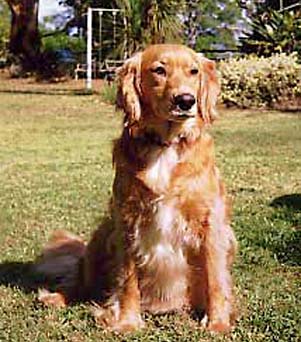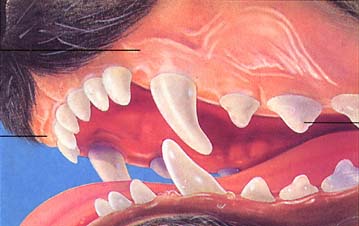GOOD DIET IS THE KEYSTONE TO GOOD HEALTH
Experience in practice, and as a pet owner of currently two dogs, and four cats, has proved to me that the following dietary advice for our pet dogs and cats (and ferrets) will help prevent disease and give your pet a long and healthy life. It is an attempt to mimic nature’s best. It should be emphasised that the diet is similar for both dog and cat, and that the basis of the diet is raw, meaty bones. Not surprisingly you will find that our domesticated carnivores are excellent processors of meat and bone. Just look at the poo from an animal fed on meaty bones. And anyway just ask our Sandy…
Every day offer:
WATER. Milk can cause diarrhoea, and often contributes to obesity.
RAW, MEATY BONES. I recommend CHICKEN WINGS or NECKS for small dogs and cats. LAMB FLAPS, BRISKETS and LAMB NECKS for larger dogs. This should make up the bulk of the daily diet – perhaps 60-80% by volume.
TABLE SCRAPS, including lightly cooked vegetables, partly digested vegetables (the equivalent of cooking) are part of the natural diet, being the devoured stomach contents of the carnivore’s prey. If there is insufficient then consider commercial off-the-shelf petfoods (biscuits are better than tinned-“the best laxative known to mankind”)
Things To Avoid
It is best to avoid COOKED or BARBEQUED BONES. Cooking makes them brittle. Chop bones, cut by band saw, have sharp edges. Large knuckle bones (bone only) can cause tooth fracture, and will also result in rate my paper constipation.
In general avoid bones that ‘man’ has processed. Let the animal do the processing!
In a similar vein avoid feeding corn cobbettes – they are often swallowed whole, and result in bowel blockage!
A FEW POINTS TO REMEMBER
Raw meaty bones are nature’s toothbrush. They help teething from the early age of 4 weeks; they help prevent a smelly breath, and chronic periodontal or GUM DISEASE. Offering exclusively mushy, processed foods is often associated with the development of gum disease. Experience and research shows that gum disease can lead to more serious, and often life-threatening, systemic conditions for example heart and kidney disease.
No one can tell us the perfect diet, not even the ‘nutritional experts’. Table scraps will cater for any small deficiencies and trace elements in the diet. Remember “variety is the spice of life”. Mineral and vitamin supplements are not necessary. Too much can often cause problems. For example there is plenty of naturally balanced calcium/phosphorus in the raw bones.
The amount you feed will depend on many factors such as body condition, exercise, age, pregnancy or lactation.
I must stress however that, just as in nature, every animal, and situation can be different. Often older animals are ‘hooked’ on to commercial flavour enhanced petfoods, and prove difficult to change their diet. Some older animals often have gum or periodontal disease and will not eat bones because of pain. I would therefore recommend that your pet should have an examination. Problems identified can be addressed and then perhaps more specific dietary advice initiated.
Your pet deserves a long and healthy life.



PERIODONTAL (GUM) DISEASE PREVENTION
Studies and observations in practice show that periodontal or gum disease exists in greater than 85% of our pet dogs and cats older than 2 years of age. Periodontal disease is the most common disease seen in general pet practice in Australia.
The pictures below indicate the stages of gum disease ranging from gingivitis (inflammation of the gums) to severe periodontitis (inflammation/infection of the tooth sockets). Pictures courtesy of Pfizer Pty Ltd.
A bad smell on the animal’s breath is often the first thing noticed by the pet owner. Other symptoms recorded are yelping when eating, swellings from root abscesses, excessive licking of lips, discharging sinuses in gums or below the eye (malar abscess) weight loss, inappetence and general lethargy and ill health.
A closer examination of the mouth especially the outside of the back and upper teeth (premolars and molars) may also reveal a thick covering of tartar (brown in colour) on the teeth, pus around teeth, generalised ulceration, gum recession, pain or even loose or missing teeth.
However the animal often shows no pain. They have no choice. Pus and poisons will circulate throughout the body leading to general ill health. Constant pain is debilitating. Periodontal disease is a slow and insidious disease that is most often hard to detect especially if there are no dramatic symptoms. It is commonly misdiagnosed as part of the ‘ageing process’.
The outcome of performing dental surgery reinforces the diagnosis. “Like a new puppy” and “Hasn’t behaved like this for years” are comments received after only 7 days.
FACTORS ASSOCIATED WITH GUM DISEASE
At the Bligh Park Veterinary Hospital we believe that correct diet is by far the best way to prevent the development of this often silent disease. Use of this diet from an early age and after dentistry is recommended.
Research has shown that too much mushy processed commercially prepared food will result in an increased incidence of periodontal disease. Similarly weaning young 3-4 week old kittens on to red mince will contribute dramatically to early symptoms of gum disease.
For more information on prevention see Good Diet is the Keystone to Good Health and “Periodontal Disease Prevention in Cats”.


VACCINATIONS
Diseases that we help to prevent include:
CANINE
FELINE
Annual booster vaccinations are recommended. Although your pet may appear healthy, this consultation allows the veterinarian to give your pet an examination that may pinpoint developing disease processes.

DESEXING
Please consider carefully before breeding from your pet. Desexing is the best way to avoid the hassles of seasons, accidental mating, problems at birth, and most importantly unwanted litters. Cats are proficient breeders from 5 months of age and are frequently pregnant again while mothering 6 week old kittens! Feral cats are a big problem in the Hawkesbury country areas and our native wildlife is suffering. With cats desexing also reduces spraying, fighting (cat abscesses) and wandering.
We recommend desexing dogs from 6 months of age, and cats from 5 months of age.
Desexed dogs are easier to train. Aggression is often reduced. However it must be noted that desexing is not always the answer to inappropriate behaviour. This subject is best discussed more fully with the vet.
Desexing allows you to feed less. Obesity often occurs if this advice is not heeded!
At the Bligh Park Veterinary Hospital desexing is only a day stay in hospital. This means you can bring in your pet of a morning and he/she will walk out that evening. All sutures are dissolving and skin wounds are sutured cosmetically. There are no external stitches. This technique prevents the complications of licking wounds, wound breakdown and infections. This allows wounds to heal quicker and you don’t need to return for stitch removal.

TRAINING
Wild dogs such as wolves, dingoes and the African wild dogs are pack animals. They will always be found in family groups. Older animals serve to feed and teach the young – puppies play and learn in groups. A social hierarchy, the ‘pecking order’, is constantly instilled into members of the group.
Domestication has lead to an unnatural situation. Puppies are separated from their littermates and elders at sale (6 – 8 weeks of age). Although domestication over thousands of years has lessened this stressful process, research and experience has shown that providing the socialising and training, thus denied at that early age, will help to reduce future bad behaviour in our canines.
At the Bligh Park Veterinary Hospital,
1. we recommend puppy preschool.
2. We recommend The Macquarie Towns all Breeds Training School
They run puppy preschools and classes for all ages of dogs at Deerubbin Park, Windsor. Please contact Cynthia Hill on 02 4576 5382. Web address is www.mactownsdogtraining.wordpress.com
Anew section of our website has been added recently dealing with DOG BARKING
This early intervention not only gives our young delinquents new ‘skills’ but also teaches their new parents how to communicate with them. And by the way . it’s also fun!
Training is an integral part of owning a dog. Training must always be reinforced. Dominating your new family member is essential, especially with the larger breeds. You must be ‘the boss of the pack’, as nothing less than this can often lead to serious misbehaviour.
Remember training takes time. However this is also rewarding as your dog will love the attention and bond more closely with their new owner.
Please consider this carefully before purchasing a dog. See ‘Choosing a Puppy‘

FLEA CONTROL
Adult fleas can lay 200 eggs at one time and live for 6 months. Eggs are laid on the animal and then drop off into the environment. The eggs will hatch into a pupal stage that buries into the soil (some 2 feet in sandy soil). Ultimately when conditions are right and they receive the right trigger, they develop into small black immature adult fleas and are in search of a suitable host in order to gain a blood meal by biting. These fleas, often inaccurately called ‘grass fleas’, are very active and difficult to find, but cause extreme pruritis (itchiness). Over time they become the mature brown adult flea capable of laying more eggs.
As environment plays a major part in the flea’s life cycle, 100% control or eradication is virtually impossible!
However new long-acting topical (spray or spot on) products and oral medicines,which are incidentally safer for animal and environment, are now the most effective tools in achieving our best flea control. Monthly oral preparations that interfere with the flea egg development may also be appropriate. It is important to apply them properly.
We currently recommend Comfortis and Panoramis for flea control on dogs. These oral products kill adult fleas within 30 mins. Topical monthly flea control products, such as Revolution, have the benefit of also preventing heartworm. This product will also treat intestinal worms in your cat (but not the dog). This is particularly useful as an easy way of worming your cat. Compare this to trying to give a worm tablet or paste! It is for this reason we recommend Revolution for cats.However Revolution does not treat tapeworm.
Profender is a topical all wormer for cats. This does treat all the intestinal worms including tapeworms and is easily applied to the back of the neck.
If you are not sure exactly what worms your product treats please phone us for our advice.
It is our experience that pet shop staff are generally unable to provide the correct advice for using the products. If the products are not applied properly they do not work and you will waste your money. Our nurses are fully trained in giving you the correct advice in the appropriate use and application of these products
Each case is different. Remember that if an animal scratches or licks excessively, fleas are not necessarily the sole cause. Scratching and excessive licking are only symptoms of a disease or diseases. We recommend an examination to diagnose the factors involved. Treating only one factor will not fix the problem.
Fleas however are most commonly the initial problem of skin disease. All year round flea prevention helps to maintain your pets healthy skin and coat.
We currently recommend Comfortis and Panoramis for flea control on dogs. These oral products kill adult fleas within 30 mins. Topical monthly flea control products, such as Revolution, have the benefit of also preventing heartworm. This product will also treat intestinal worms in your cat (but not the dog). This is particularly useful as an easy way of worming your cat. Compare this to trying to give a worm tablet or paste! It is for this reason we recommend Revolution for cats. However Revolution does not treat tapeworm.
Profender is a topical all wormer for cats. This does treat all the intestinal worms including tapeworms and is easily applied to the back of the neck.

HEARTWORM AND INTESTINAL WORM CONTROL
In rder to prevent this serious disease we suggest starting heartworm prevention with your puppy from 6 weeks of age.
We recommend giving your dog heartworm prevention on a monthly basis. In particular the product of choice comes as a chewable beef cube and has the added benefit of controlling most intestinal worms. Tapeworm tablets, used on a regular basis, will complete the control of all the worms that can commonly infect our pet dogs. Our staff will remind you about tapeworming when you purchase your 6-month’s supply of heartworm prevention.
When your puppy is fully grown there is an alternative to the monthly prevention. We recommend the injection known as SR-12. This prevents heartworm infection for 12 months and can be given at the time of vaccination.
Please be aware these products are not licensed for use on ferrets and rabbits. These chemicals are very safe for cats and dogs but different species have different reactions to drugs. Off label use can cause severe harm. Check with the vet before use.
In the event of missed heartworm prevention we strongly advise an examination, and heartworm test. Clinical signs consistent with heartworm disease will require more accurate tests. Most monthly heartworm preventatives are prescription only.
We do not recommend heartworm prevention in cats because of the apparent low level of infection and disease diagnosed.
Common intestinal worms found in our pets include roundworm, hookworm, whipworm, and tapeworm.
With very young puppies start intestinal worming with a syrup from 2 weeks of age and repeat every 2 weeks until initiating the monthly heartworm prevention.
Kittens should likewise be wormed from an early age, and once over 12 weeks, every 3 months with tablets or pastes.
Flea control helps prevent tapeworm infection. The flea is the intermediate host for the most common tapeworm affecting both dog and cat.


MICROCHIPPING AND COUNCIL REGISTRATION
There are important legal aspects and requirements to owning a dog and a cat. From the 1st July 99 the NSW Companion Animals Act comes into force.
Animal identification by microchipping is an integral part of this legislation. Microchipping allows vets and pounds to identify and return lost pets to their owners.
All animals that change ownership must be microchipped at the time of changeover.
The full details of the NSW Companion Animals Act can be read at www.dlg.nsw.gov.au
The Bligh Park Veterinary Hospital has microchips and a multi scanner capable of reading all currently used microchips.
COUNCIL REGISTRATION
All animals older than 6 months have to be registered with the Local Council. The fees are currently $195 for a non desexed animal and $53 for a desexed pet. This fee is LIFETIME.
Concessions will be given for appropriate groups. The fee is much reduced to encourage desexing. All fees are payable to the Dept of Local Government however the council is responsible for enforcing the new law.
The new Act requires that you keep your dog under control at all times ie on a lead. Under the new Act Council must provide an area where dogs can be let off the lead. They must also provide receptacles for dog excrement disposal.
The Act also requires that cats be kept within your own property. However enforcing this will be amusing, considering their ability to climb!
Pet collar identification for dogs and cats is encouraged at the hospital. There is a large selection of engraved tags available for purchase over the counter.

Caring To Prevent
Caring To Prevent
Caring To Prevent
